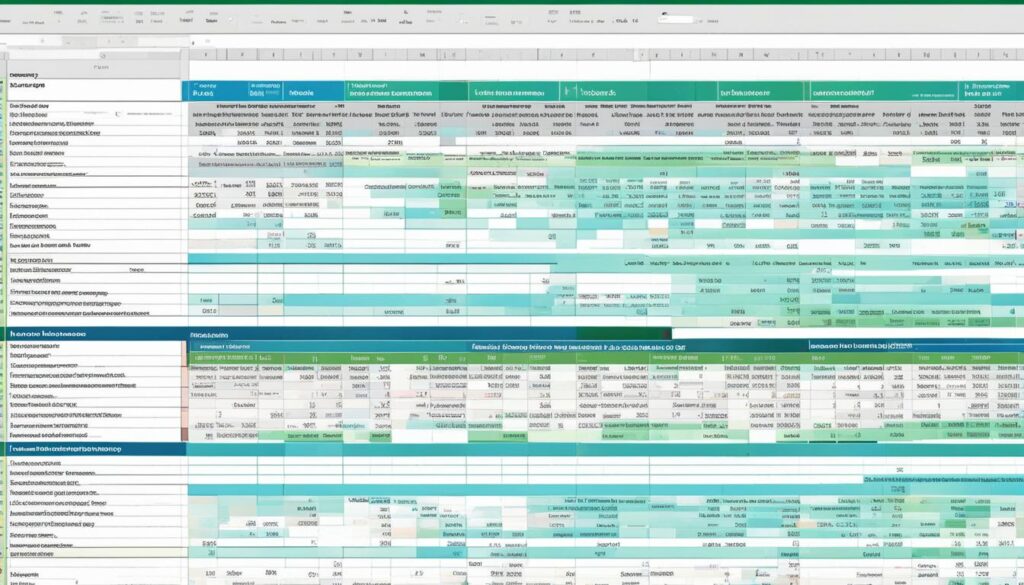Selling a business can be a complex and challenging process. Whether you are looking to sell a small business or a larger enterprise, it requires careful planning, preparation, and execution to achieve a successful sale. In this comprehensive guide, we will take you through the step-by-step process of how to sell your business in an efficient and effective manner.
If you’ve ever wondered, “How can I sell my business?” or “Where do I start to sell my small business?” this guide is for you. We will provide expert tips and guidance to help you navigate the selling process and maximize the value of your business.
Key Takeaways:
Follow a step-by-step process to effectively sell your business.
Gather all relevant business documents, including financials and legal documents.
Consider hiring a business broker or M&A advisor to guide you through the selling process.
Create a targeted list of potential buyers and investors for your business.
Market your business to potential buyers and receive indications of interest.
Considerations Before Selling Your Business
Market Conditions
Assessing market conditions is crucial when selling your business. The value of your business can be influenced by factors such as industry trends, demand for similar businesses, and the overall economic climate. Conduct thorough research to understand the market dynamics and determine the ideal timing for selling your business.
Financing Options
Exploring financing options is important for potential buyers who may require assistance in purchasing your business. Consider different financing arrangements, such as seller financing or bank loans, to accommodate potential buyers’ needs. Having flexible financing options can help attract more qualified buyers and facilitate a smooth transaction.
Business Preparation
Prior to selling your business, it’s crucial to ensure it is well-prepared and positioned for a successful sale. This involves preparing comprehensive financial statements, organizing legal documents, and enhancing the overall operational efficiency of your own business operations. Presenting a well-prepared business significantly increases its attractiveness to potential buyers.
Maintaining Clean and Well-Documented Financials
One of the key factors in selling a business is maintaining clean and well-documented financials. This involves paying taxes, showing a profit on tax returns, and having accurate financial statements. Potential buyers will scrutinize your financials, and having organized and accurate records will increase their confidence in your business.
Before listing your own business online or for sale, it is crucial to review your financial documentation and make sure it is complete and accurate. This includes:
Income and Expense Statements: Prepare detailed income and expense statements that clearly show the revenue sources and expenses of your business. Make sure all transactions are properly recorded and classified.
Balance Sheet: Create a comprehensive balance sheet that accurately presents your business’s assets, liabilities, and equity. This can help potential buyers assess the financial stability and value of your business.
Cash Flow Statement: Develop a cash flow statement that provides insights into the cash inflows and outflows of your business. This document helps in understanding the cash flow patterns and liquidity of your business.
Tax Returns: Keep copies of your tax returns for at least the past three years. Buyers often request these documents to ensure compliance and assess the tax implications of the transaction.
Benefits of Clean Financials:
Maintaining clean financials offers several benefits during the business sale process:
Increased Buyer Confidence: Accurate and well-documented financial records instill confidence in potential buyers, showing them that your business is financially stable and operated in a professional manner.
Efficient Due Diligence: Clean financials simplify the due diligence process by providing all the necessary information readily. This can expedite the buyer’s evaluation process and potentially result in a faster transaction.
Better Negotiation Position: Strong financial documentation can strengthen your negotiating position, as it demonstrates the true value and potential of your business. Buyers are more likely to offer favorable terms and a higher purchase price.
By prioritizing clean financials, you not only improve your chances of attracting serious buyers but also streamline the entire selling process. It showcases your commitment to financial transparency and positions your business as a reliable investment opportunity.
Find the Value of Your Business
Before listing your business for sale, it is crucial to understand its true value. A professional business valuation can provide you with an accurate estimate of your business’s worth, giving you the knowledge and confidence you need to set an appropriate asking price and negotiate a sales price with potential buyers.
A business valuation is a comprehensive assessment that takes into consideration various factors, such as financial stability, historic sales performance, industry trends, and comparable businesses that have recently been sold. By analyzing these key elements, a professional valuation expert can determine the fair market value of your business.
To get a valuation of your company, please fill out your information on our form.
Step 1: Getting Your Business Documents Together
The first step in selling your business is to gather all relevant business documents. This includes financials, tax returns, legal documents, operational docs, customer/supplier info, intellectual property docs, employee details, and future projections. You can review our selling checklist to give you a list of all the relevant documents.
Organize your business documents in a systematic and accessible manner, making it easier for buyers to review and analyze the information. This can significantly streamline the due diligence process, build trust, and expedite the sale.
Step 2: Hire a Business Broker or M&A Advisor
When it comes to selling your business, enlisting the expertise of a business broker or M&A advisor can be a game-changer. These professionals possess the knowledge, skills, and resources needed to navigate the complex process of selling a business. Whether you’re a small business owner or an entrepreneur with a large enterprise, hiring a business broker or M&A advisor can significantly increase your chances of a successful sale.
When hiring a business broker or M&A advisor, it’s crucial to choose someone with relevant experience and a track record of successful business transactions done in your industry. Take the time to thoroughly research potential candidates and ask for referrals from trusted sources. This will ensure that you find a professional who understands your specific needs and can guide you toward a successful business sale.
Step 3: Your Business Broker Will Prepare a CIM & Data Room
As you progress in selling your business, your business broker will play a crucial role in preparing a key marketing document known as the Confidential Information Memorandum (CIM). This comprehensive report provides potential buyers with detailed information about your business. View our full guide here:
The CIM includes essential details such as:
Information on your business departments and their functions
Insights into client and customer concentration
Differentiation strategies that set your business apart from competitors
Highlights of your talented teams and their roles
Forward-looking materials, including growth projections and plans
Industry research and analysis to showcase market potential
The CIM serves as a powerful marketing tool, presenting your business in the best possible light to potential buyers. It helps them gain a comprehensive understanding of your business’s strengths, growth prospects, and value proposition.
To maintain confidentiality during the selling process, all the materials, including the CIM and other relevant documents, will be stored in a secure data room. This virtual space allows potential buyers to access and review the information while ensuring the confidentiality of sensitive details.
Step 4: Create a Targeted Business Buyer/Investor List
Once you have gathered all the necessary business documents and hired a business broker or M&A advisor, it’s time to focus on creating a targeted buyer and investor list for your business. This step is crucial as it helps ensure that you connect with interested parties who align with your business goals and objectives.
To create a targeted list, you can utilize various resources and strategies:
Utilize your broker’s buyer database: A reputable business broker will have an extensive database of potential buyers who are actively seeking investment opportunities. By leveraging their network, you can connect with interested parties who are already in the market for a business acquisition.
Explore outside investor databases: In addition to your broker’s database, you can also consider using outside investor databases to expand your reach. These databases provide access to a wide range of potential investors who may be interested in your industry or business type.
Identify strategic buyers: Strategic buyers are individuals or companies that can benefit from acquiring your business due to synergistic advantages. These can include competitors, suppliers, or even customers who may have a vested interest in entering your market. By targeting strategic buyers, you increase the likelihood of finding qualified and motivated buyers.
It’s important to tailor your buyer and investor list to your specific business. Consider factors such as industry, business size, location, and growth potential. By focusing on relevant targets, you increase the chances of attracting serious buyers who are genuinely interested in your business.
Example Targeted Buyer/Investor List
| Buyer/Investor Type | Industry | Geographical Focus | Investment Criteria |
|---|---|---|---|
| Private Equity Firm | Manufacturing | Nationwide | $5 million+ EBITDA, Add-on acquisitions |
| Strategic Buyer | Technology | International | Software companies with complementary products |
| High-Net-Worth Individual | Service | Local | Owner-operator businesses with stable cash flow |
Creating a targeted buyer and investor list not only streamlines the selling process but also increases your chances of a successful sale. By engaging with interested parties who have a genuine interest in your business, you can negotiate terms more effectively and find the best match for your business needs.
Step 5: Market the Business to Potential Buyers
Now that all the necessary materials are prepared, it’s time to market your business to potential buyers and generate interest in your offering. This crucial step involves creating a compelling teaser document that highlights the key strengths and unique selling points of your own business model.
To protect the confidentiality of sensitive information, it is important to have potential to find qualified buyers who sign non-disclosure agreements (NDAs) before providing them access to the data room. NDAs ensure that the details of your business remain confidential and are only shared with serious and qualified buyers.
Once the teaser document and NDAs are in place, you can grant potential buyers access to the data room. The data room is where all the detailed information about your business is stored, including financial records, operational data, customer insights, and other pertinent information that potential buyers need to evaluate your business.
The marketing process typically takes 6-8 weeks and involves reaching out to a carefully curated list of potential buyers. These buyers can be individuals, investment firms, or strategic partners who have expressed interest in businesses similar to yours.
The goal of the marketing phase is to generate indications of interest (IOIs) from potential buyers. These IOIs outline their proposed offer for your business, including the purchase price, deal structure, and any contingencies they may have. Evaluating and comparing the IOIs will help you identify the most promising buyers to move forward with in the next stage of the selling process.
Step 6: Receive Indications of Interest (IOIs)
After potential buyers submit their Indications of Interest (IOIs), you will receive offers outlining the broad terms of their proposed offer for the business. These IOIs are a crucial step in the selling process as they provide valuable insights into the buyers’ intentions and their perception of your business’s value.
The offers you receive will typically include details such as the purchase price, structure of the deal, financing arrangements, and any other relevant terms. It’s essential to carefully evaluate these offers and consider their alignment with your goals and expectations.
The purchase price stated in the IOIs represents the amount the buyer is willing to pay for your business. However, keep in mind that this selling price is a preliminary offer and may be subject to negotiations and adjustments as the process moves forward. Consider the proposed offer in conjunction with other factors, such as buyer qualifications, compatibility with your business’s future plans, and the overall market conditions.
Once you have received the IOIs, it is time to choose the finalists who will proceed to the next round of bids. Selecting the right buyers to move forward with is crucial, as it sets the stage for further negotiations and eventually the successful sale of your business.
Step 7: Hold Management Meetings With Finalists
With the list of finalists in hand, it’s time to hold management meetings to provide them with more detailed information about your business. These meetings play a crucial role in evaluating the seriousness and capabilities of your business processes to the potential buyers. During the management meetings, you will have the opportunity to showcase the value and potential of your business, answer any questions they may have, and further gauge their interest.
The finalists will use the insights gained from these meetings to prepare a letter of intent (LOI), which outlines their proposal to buy the business. The LOI includes important details such as the price, terms, and structure of their offer. This document serves as a formal expression of the buyer’s intention to proceed with the acquisition and provides a basis for further negotiations.
Evaluating Finalists: Key Considerations
When evaluating the finalists, keep the following factors in mind:
Their understanding of your business and its industry
Their financial capability to complete the deal
Their proposed strategy for the future of the business
Their compatibility with your company culture and values
“Remember, it’s not just about finding a buyer with the highest offer, but also finding someone who aligns with your vision for the business and has the resources to help it thrive.”
By carefully assessing these factors, you can make an informed decision and proceed with the most suitable finalist. This step brings you closer to the finalizing the sale of your business.
Letters of intent provide both parties with a clear understanding of each other’s intentions and set the stage for further negotiations and due diligence. As the seller, it is important to carefully review the letters of intent and assess whether they align with your expectations and objectives. This includes evaluating the proposed price and the terms relating to factors such as payment structure, financing, and potential contingencies.
“Letters of intent are essential in the business selling process as they establish the groundwork for further negotiations and due diligence. Sellers should carefully examine the proposed price and terms to ensure they align with their goals and financial expectations.”
During the review process, you may identify areas of the proposal that require clarification or modification. It is common for buyers and sellers to engage in negotiations to refine the terms of the letter of intent before progressing to the next stage of the sale process.
Upon reaching a mutually acceptable agreement, the next step is to sign the letter of intent and continue with the sale process. It is important to note that the letter of intent is typically considered non-binding, except for specific provisions such as confidentiality and exclusivity. The definitive agreement, such as a purchase agreement, will be the legally binding document that outlines the final terms and conditions of the transaction.
Step 9: Conduct Due Diligence
Once the Letter of Intent (LOI) is signed, the next critical step in the process of selling your business is conducting due diligence. During this phase, the buyer will thoroughly review and verify all relevant business records, financials, and other documentation to ensure the accuracy and reliability of the information provided.
Detailed records and documentation play a crucial role in instilling confidence in potential buyers. By maintaining organized and accurate business records, you can demonstrate the financial stability and operational efficiency of your business, making it more attractive to prospective buyers.
Why is Due Diligence Important?
Diligently conducting due diligence is essential for both the buyer and the seller. For the buyer, it offers reassurance by validating the information provided and identifying any potential risks or issues that need to be addressed before finalizing the transaction. As the seller, it provides an opportunity to showcase the value and viability of your business, while also helping you anticipate and address any concerns that may arise during the sales process.
During due diligence, the potential buyer will carefully review various aspects of your business, including:
Financial Statements: This includes income statements, balance sheets, and cash flow statements. The buyer will analyze these documents to assess the financial performance and stability of your business.
Tax Returns: The buyer will review tax returns to verify the accuracy of reported income and ensure compliance with tax obligations.
Contracts and Agreements: Any existing contracts, agreements, or legal documents related to the business will be examined for legal compliance and any potential risks.
Operational Documents: This includes business licenses, permits, insurance policies, and any other documents that are vital for the day-to-day operations of the business.
Intellectual Property: If your business holds any patents, trademarks, or copyrights, the buyer will evaluate their value and assess the level of protection they offer.
Customer and Supplier Information: The buyer will examine customer and supplier contracts, relationships, and any concentration risks.
By promptly providing all requested information and ensuring its accuracy, you can help expedite the due diligence process and maintain the trust and confidence of potential buyers.
The Role of Financials in Due Diligence
One of the key aspects of due diligence is a thorough examination of the financials of your business. Potential buyers will meticulously analyze your financial statements to assess the financial health, profitability, and growth potential of your business.
Step 10: Selling A Business & Fulfill Transition Duties
As part of the sale process, it is common for sellers to have transition duties to assist the buyer in seamlessly taking over the business. These transition duties can vary but often involve providing seller assistance and finalizing employment agreements. By fulfilling these responsibilities, you can ensure a smooth transition of business assets and increase the buyer’s confidence in the business’s future success.
Employment Agreements
Furthermore, as part of the closing process, employment agreements may need to be finalized. These agreements outline the terms and conditions of employment for key employees or the seller who will stay on to assist with the transition. By clearly defining roles, responsibilities, and compensation, employment agreements provide clarity and minimize potential conflicts.
Benefits of Fulfilling Transition DutiesChallenges of Fulfilling Transition Duties
Ensures a smooth transition for the buyer
Provides valuable insights and knowledge
Maintains relationships with key stakeholders
Balancing new commitments with transition duties
Adjusting to a changing role within the business
Managing expectations and potential conflicts
Fulfilling transition duties requires careful planning, effective communication, and a commitment to the successful transfer of the business. By actively participating in the transition process and providing the new owner with the necessary support, you can help ensure the buyer’s confidence and set the foundation for the business’s continued success under new ownership.
| Benefits of Fulfilling Transition Duties | Challenges of Fulfilling Transition Duties |
|---|---|
|
|
Fulfilling transition duties requires careful planning, effective communication, and a commitment to the successful transfer of the business. By actively participating in the transition process and providing the necessary support, you can help ensure the buyer’s confidence and set the foundation for the business’s continued success under new ownership.
Conclusion
Selling a business can be a complex and challenging process, but by following the steps outlined in this comprehensive business brokers guide, you can significantly increase your chances of a successful sale. From gathering all the necessary business documents to finding qualified buyers and finalizing the deal, each step plays a crucial role in achieving the best outcome for your business sale.
Read More: How to Sell My Restaurant
Read More: How to Sell My Franchise Business
Read More: How to Sell My Dental Office











